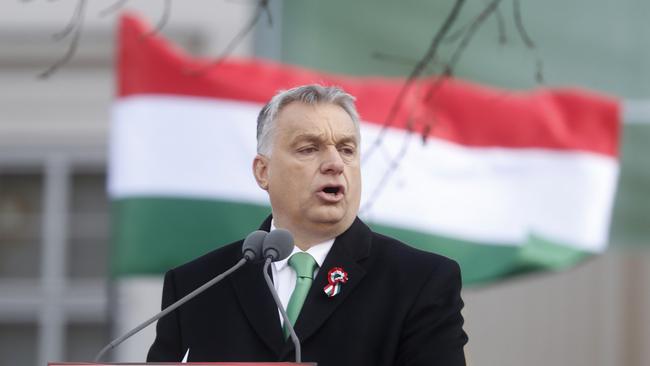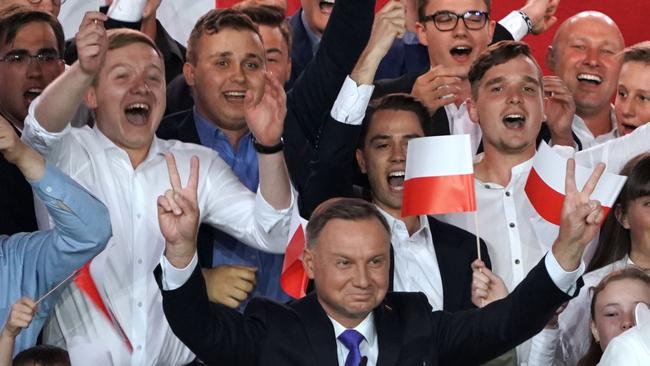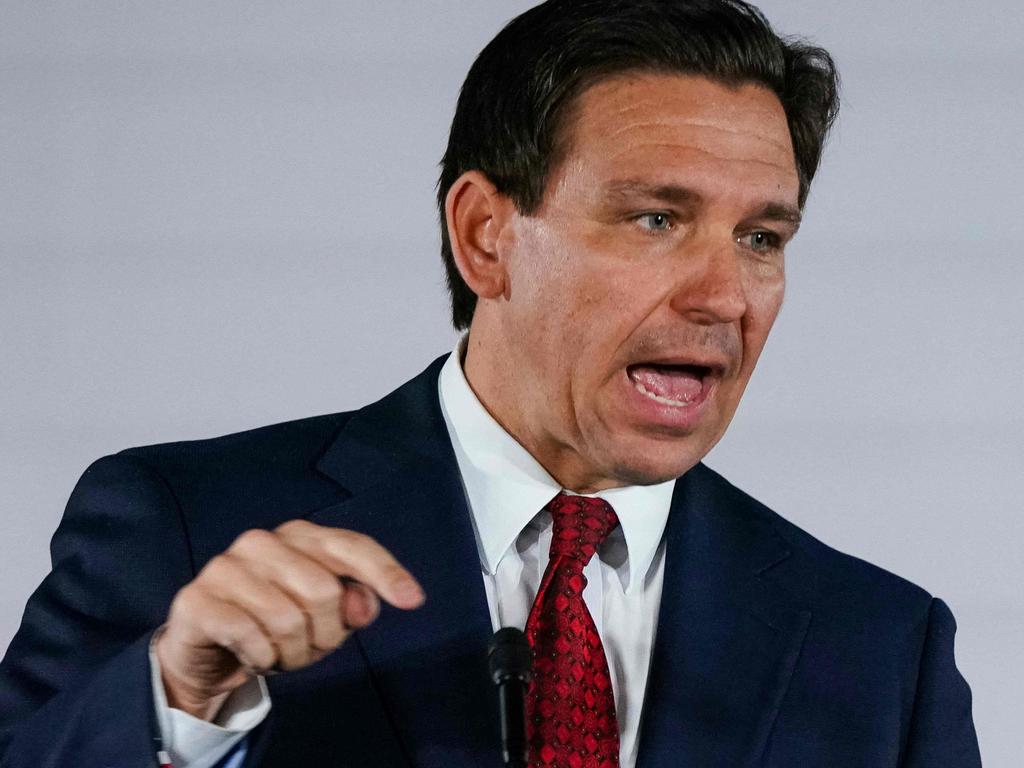Hungary, and Florida, offer tips for conservative revival
Leaders such as Hungary’s Viktor Orban, Italy’s Giorgia Meloni and Florida governor Ron DeSantis are leading a comeback in classical liberalism.

The governments of Hungary under Prime Minister Viktor Orban and Poland under President Andrzej Duda have fallen out recently over the degree to which each opposes Russia’s invasion of Ukraine. While that’s a critically important issue that deserves the prominence it gets, it’s still the fact that Poland and Hungary are the two great defiant Western states, refusing to toe the line of coercive and ideological contemporary left-liberalism, as opposed to classical liberalism that prizes individual freedom.

Beyond the West, such defiance is now routine. Nobody expects Indonesia or Singapore, or any Asian or African or Middle East or even Latin American nation, to fulfil all the woke requirements, ideological psalm singing and recitations of gender and race catechisms of the EU, the US, Canada, Australia and New Zealand.
The left is dominant in the West partly because it has substantially completed a program of taking over almost all significant state institutions, plus creating a raft of new institutions, and using them to promote an identity politics-based new ideology that insists the West itself is evil, racist and so on. And that all policy must be directed to performative left-liberal gestures and identity politics goals of increasing narrowness and intolerance. Thus in Australia we are about to vote to entrench race in the Constitution when classical liberalism has fought for hundreds of years to remove race from civic considerations.
In the US there is a substantial conservative reaction, not led by Donald Trump, who has some conservative prejudices but is all over the shop intellectually and could never transform his many and varied hatreds into coherent policy.
Instead, it is led, for the moment at least, by DeSantis, who won re-election as Florida governor by nearly 20 percentage points. In his campaign autobiography, DeSantis wrote: “Most institutions in American life have become thoroughly politicised.” Unlike Australian conservative leaders, DeSantis actually has plans to change that institutional regime. Thus he has made it illegal to teach gender theory to infants and primary school children, a move that has strong public support. And he has made it easier for parents to found independent schools.
DeSantis is rightly not taking any measure to discriminate against LGBTQ people. But he is refusing to use state resources to promote an associated ideology.
Similar trends are starting to emerge in Europe. Traditional European conservative parties, having lost all sense of purpose and fight, have been substantially replaced by parties that were once labelled far right. Thus Giorgia Meloni, the Italian Prime Minister, leads the Brothers of Italy. It had its origins decades ago in fascism but is not remotely fascist today. The Sweden Democrats, now the biggest party in Sweden’s ruling coalition, had more recent roots in extremism but are nothing remotely like that today. France’s National Rally, led by Marine Le Pen, has completely repudiated its anti-Semitic past and now routinely comes second in national elections with an ever-increasing vote.
These European parties are reasonably described as national conservative. They are no longer extreme but, like DeSantis in Florida and the governments in Hungary and Poland, they want to reverse the cloying ideological narrowness and failure of contemporary Western left-liberalism. Many of them have classical conservative intellectual roots. Meloni, typically, is devoted to English philosopher Roger Scruton, to The Lord of the Rings author JRR Tolkien and to the great Christian thinker GK Chesterton. These are superb sources of intellectual inspiration for a conservative. I wonder how many Australian Liberals and Nationals have read these three authors.

There is a desperate and wild over-reaction to all this in bien-pensant circles in Europe and North America. The Economist, a confused magazine these days but generally left-liberal politically and socially, ran a lengthy article on Hungary as China’s cat’s paw in Europe. Yet as a government spokesman in Budapest points out to me, even the single city of Melbourne does many times the volume of trade with China that the whole of Hungary does.
Former prime minister Tony Abbott says: “Orban has secured Hungary’s borders, massively boosted its prosperity and stood up to the woke EU in support of his country’s cultural priorities. That looks like a pretty successful government and political movement to me. As for the ‘authoritarian’ tag, it’s hard to see the justification given that Hungary has free elections, a free press and an independent judiciary. I suspect he’s only described that way because he’s a successful conservative.”
The Australian government effectively shares Abbott’s view. The official view of the Department of Foreign Affairs and Trade rejects the idea that Orban runs an authoritarian dictatorship or anything like it.
Instead, the view is that Canberra disagrees with some of Hungary’s social policies. None of those policies represents human rights violations in any universe vaguely connected with the real world.
Poland is not being vilified at the moment because it’s so much a leader in the resistance against Russia’s invasion, but Orban’s government also condemns Russia’s invasion. It has not, however, generally been helpful to the Western alliance, of which it is part, on sanctions. But the demonising of Hungary is absurd and an illustration of the desperate intolerance of Western left-liberalism. It’s as if there’s no legitimate alternative to the social policies of San Francisco, nothing between San Francisco and the Taliban, and any Western polity that is not San Francisco (with all its economic crises and social dysfunction) must be the moral and political equivalent of the Taliban.

This week in Budapest I had a long discussion with Zsolt Nemeth, who 40 years ago with Orban founded Hungary’s ruling Fidesz party and is now the chairman of the Hungarian parliament’s foreign affairs committee. We meet in his vintage central European office in Budapest’s grand parliament building, a long way from Fidesz’s beginnings as an anti-communist youth group that became a formal political party 35 years ago. Initially, it had an upper age limit of 35, which was a great barrier to communist infiltration.
Orban and Fidesz have been continuously in power since 2010. No one doubts the elections are fair. Fidesz often wins a majority of seats with only a plurality of votes, but this is the same in Britain or Australia. The state-owned media is pro-government, which means pro-conservative. This is in contrast to state-owned media in Western societies that invariably is left-liberal in bias and orientation.
I ask Nemeth what the Fidesz view is of liberalism today: “For us, liberalism was very attractive in communist times when freedom was its central value. America was crucial. We have statues of Ronald Reagan and George Bush (in Budapest). But liberalism went through a process and became coercive against the Christian democratic world view and values we represent. That made it our ideological enemy. In central Europe, communism in a strange way saved us from many of the extreme developments in Western progressive liberalism.
“Normality survived here. The churches played a crucial role in resisting communism. They were generally not overtly political, though there were exceptions. The basic social structures, and the family itself, survived. We felt an obligation to defend these values when they were attacked.”
An earlier Hungarian party, in a brief post-war democratic interlude, had the slogan: “God, homeland, family” and “that became very important to us”.
Nemeth places Hungary’s political trajectory in the context of Western politics: “In the US and western Europe there is a polarisation between extreme liberalism and traditional Western Christian values. We find our allies in the centre and right parties (around the West).” He argues that Hungary is constantly misrepresented in left-liberal media in the West: “That is the general modus operandi of the progressive left all around the world. That’s how they operate.
“ We need to fight that. The public itself is not responsible for being manipulated.”
On foreign policy, Hungary is again often misrepresented. I have lost count of the times I’ve seen Orban described as Vladimir Putin’s ally. This is nonsense. Oban is certainly less keen on sanctions than most of western Europe. But he is no ally of Putin. His government’s actual actions have not been so radically different from those of Germany or France.
Nemeth says: “We have condemned Russia from the very first day. We have passed parliamentary resolutions on this and we’ve sided with Ukraine and demonstrated solidarity with them as victims of this brutal aggression. We’ve made it clear we believe Ukraine should be restored in its territorial integrity and sovereignty. We hope to have Ukraine as part of a new central Europe. At the same time, we want Russia not to be a threat.” These are strong words from Nemeth and they represent the bedrock of Hungary’s position.
Nonetheless, Budapest has prevented the direct transfer of weapons to Ukraine through its territory. Nemeth’s explanation focuses on the substantial ethnic Hungarian minority in Ukraine, concentrated across Hungary’s border with Ukraine. “We don’t want the war to come closer to Hungary,” he says. “This is still an island of peace in Ukraine.”
Nemeth says to reach peace the conflict must go through three phases: a ceasefire, followed by a peace agreement, which would be followed by the phase of reconstruction and the establishment of a new order. He says Hungary wants to shorten the first phase, which means getting a ceasefire quickly, even if that lengthens the second phase, negotiating the peace agreement.
You might discern two broad strands of allied opinion on Ukraine. The US, Britain, Sweden, Poland, the Baltic states and others believe it is of central importance that Russia suffer a heavy defeat and that all, or almost all, Ukrainian territory is returned to Kyiv. France, Germany, Hungary and some of the other European states want a ceasefire as quickly as possible. Hungary, like other European states, is heavily dependent on Russian energy.
“We are conscious this war may last a long time,” Nemeth says. “Our societies in Europe must remain capable of taking action. If social tensions get too high, political leaderships will become paralysed. Energy is now four times more expensive than before. The logic of the energy sanctions is not necessarily harming Russia but harms us more. We should be more selective.
“We (the Hungarian government) may be unusual in Europe but internationally our position is not unique. It is important for the West to consider how it engages the global south.”
On China, Nemeth is equally nuanced: “Some say we are moving towards a new cold war.”
Nemeth distinguishes the digital economy, which is almost incapable of not being engaged, and the traditional industrial economy, which is more liable to separateness and national oppositions. These two dynamics will play out simultaneously, he believes.
“We’ll witness a dichotomy of opposition and co-operation between these two giants.”
Hungary is against a new cold war, he says, and against cold war-style rhetoric, but “this doesn’t mean we shouldn’t protect ourselves from too much Chinese influence”. But he points out that Hungary’s trade with China is minuscule compared with that of Germany, Britain, Italy or Australia.
None of this is to suggest that Hungary’s policies towards Russia or China are right, or couldn’t be better. But the demonisation of what is reasonable disagreement is related to Hungary’s overall political unacceptability in Western political orthodoxy.
Most of the things international left-liberals object to in Hungary are legitimate matters of domestic debate and decision. There is no reason every Western nation must follow the same social policies.
Thus the Hungarian government devotes substantial resources to encouraging its citizens to have children. It has succeeded in lifting the birthrate. It in effect pays women money to stay home with their kids. This outrages international feminist consciousness and some versions of liberal capitalism that are determined that every woman should work in paid employment outside the home all the time, whether she wants to or not.
But Hungary’s policy is certainly no breach of human rights. It’s an interesting experiment in social policy that should be looked at for lessons. And it’s very popular with the Hungarian people.
Similarly, Hungary is against mass immigration. I am personally strongly in favour of a very big and racially non-discriminatory immigration program for Australia. But it’s not necessary that every country must be the same. And Western liberal opinion never makes the same demands of non-Western nations, many of which heavily restrict immigration.
The Hungarian government values the Christian heritage of Hungary. Western left-liberal opinion holds the extremely perverse view that every society, every people, should revere and celebrate their own traditions except for Western nations, who uniquely must despise their past. The vast majority of Hungarians don’t go to church and there is no coercion in any religious matter, but Hungarians celebrate and honour, and wish to preserve, their Christian cultural heritage. For my money, that’s a good thing.
Perhaps the most controversial law is one that forbids pro-LGBTQ advocacy in schools and restricts explicit LGBTQ content from TV during the day. It also restricts corporations from donating corporate money to support LGBTQ advocacy. It doesn’t restrict individuals, including wealthy corporate leaders, from using their own money to support LGBTQ causes and advocacy.
There is room to disagree with the balance Hungary has struck. It is not remotely a serious breach of human rights. You might compare it with forcing professional rugby league players to wear on their own bodies jerseys that proclaim an ideology at odds with their personal beliefs.
Conservatives need to fight for, win and build institutions if they are ever to seriously influence society again. The fighting conservative parties of Europe, all of them national conservatives, and the non-Trump but hard-headed conservatives in America, like DeSantis, are at least making this effort, offering their people an alternative.
Hungary and Poland in their different ways also offer an alternative. Freedom is the central virtue of both the conservative and the liberal traditions.
But if freedom is real it must logically result in diversity. Hungary should be seen as a fascinating social and political experiment, certainly with plenty of flaws, but also with something to offer.
Greg Sheridan was a visiting fellow for one week at Budapest’s Danube Institute.







If there is ever to be a conservative revival in Western politics, it’s quite likely it will look like an amalgam of Florida under Ron DeSantis, Hungary and Poland under their conservative nationalist governments, and in western Europe it will be led by parties that were formerly classed as far right but are now just solidly conservative, having displaced the old conservative parties of yesteryear.